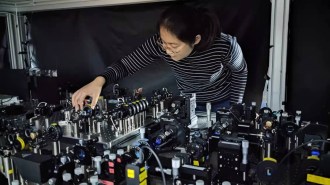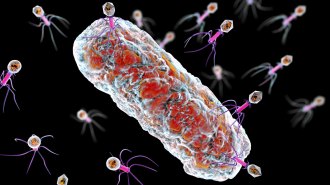News
-
 Quantum Physics
Quantum PhysicsQuantum physics requires imaginary numbers to explain reality
Quantum theory based only on real numbers fails to explain the results of two new experiments.
-
 Health & Medicine
Health & MedicineHow sleep may boost creativity
In a lab experiment, people who had fallen into a shallow sleep were more likely than non- or deep sleepers to later discover a sly math trick.
-
 Microbes
MicrobesA bacteria-virus arms race could lead to a new way to treat shigellosis
As bacteria that cause shigellosis evolve to escape a virus, the microbes may become less deadly, a hopeful sign for “phage therapy.”
-
 Climate
ClimateAntarctica’s Thwaites Glacier ice shelf could collapse within five years
The loss of Thwaites’ buttressing ice shelf could hasten the demise of the “Doomsday Glacier” and raise the risk of dramatic sea level rise.
-
 Astronomy
AstronomyThe only known pulsar duo sheds new light on general relativity and more
Einstein was right, among other insights gleaned from watching a one-of-a-kind system of two pulsating dead stars for 16 years.
-
 Astronomy
AstronomyThe cosmic ‘Cow’ may have produced a new neutron star or black hole
A bright, mysterious blast of extragalactic light appears to have spawned a small, compact object.
-
 Planetary Science
Planetary ScienceIngenuity is still flying on Mars. Here’s what the helicopter is up to
NASA’s Ingenuity craft was originally planned to operate only 30 Martian days.
-
 Life
LifeCleared tropical forests can regain ground surprisingly fast
Tropical forests can re-establish themselves on abandoned agricultural lands faster than expected, scientists say.
-
 Climate
ClimateWildfire smoke may ramp up toxic ozone production in cities
A new study reveals how wildfire smoke produces toxic ozone and how urban air pollution could exacerbate the problem.
-
 Quantum Physics
Quantum PhysicsPhysicists have coaxed ultracold atoms into an elusive form of quantum matter
Quantum spin liquids could be used to help protect fragile information in quantum computers.
-
 Health & Medicine
Health & MedicineA massive 8-year effort finds that much cancer research can’t be replicated
A project aiming to reproduce nearly 200 top cancer experiments found only a quarter could be replicated.
By Tara Haelle -
 Life
LifeLight-colored feathers may help migrating birds stay cool on long flights
Analysis of over 20,000 illustrations of birds reveals that migrating birds generally tend to have lighter-colored feathers than birds that stay put.